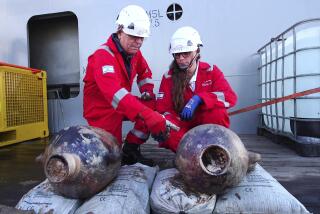Israeli Archeological Dig Sparks Palestinian Complaints : Mideast: Arabs see last-minute plundering of occupied territories. Jerusalem denies search has political goals.
- Share via
JERUSALEM — Sixteen teams of Israeli archeologists launched a sweeping search through caves near the Dead Sea on Sunday in what Palestinians complained was a last-minute hunt for artifacts before Israel withdraws from the area.
The controversy provided a taste of possible battles to come when archeology reaches the agenda of talks now under way on Palestinian self-rule in the occupied territories.
Among expected disputes are Palestinian claims to other Israeli finds in the occupied territories, including the fabulous Dead Sea Scrolls now housed in Jerusalem’s Shrine of the Book museum.
The Israeli Antiquities Authority said the survey near the sites where the Dead Sea Scrolls were found had been planned for years and denied it had political goals.
“The main cause for the survey is to see if there are any Dead Sea Scrolls left in the area and that the Bedouins didn’t take,” said Efrat Orbach, spokeswoman for the agency. “If we don’t take what’s left, the treasures will be lost for the world.”
But Palestinian archeologist Nazmi Jubeh of Birzeit University on the occupied West Bank objected.
“We are condemning such a survey at this time because we see it as having some political meaning,” he said. “This section will soon be a part of the Palestinian-controlled area.”
It is not clear yet whether the Qumran area, where the survey began Sunday, will actually fall into the zone of Palestinian autonomy due to take effect beginning next month as agreed to by Israel and the Palestine Liberation Organization.
If talks progress well, however, almost all of the occupied territories are expected to pass over to Palestinian self-rule, including areas of Judea and Samaria that archeologists and historians see as part of the cradle of Judaism and Christianity.
The Dead Sea Scrolls, found in caves in the late 1940s and early 1950s, include books of the Bible as well as examples of Psalms, blessings and social rules believed to date from about 100 BC.
Orbach said the area has been so thoroughly picked over by Bedouins, nomadic desert Arabs who have combed the caves, that archeologists are very pessimistic about finding anything of value.
If they do, they will likely have to contend with even more strident protests from Palestinians, who argue that it is a gesture of poor faith to launch a digging campaign before negotiators can decide on the ground rules.
About two years ago, Israel agreed as part of a 15-year-old peace agreement to return to Egypt all the archeological finds it had made in the Sinai Desert during the years Israel held that Egyptian territory.
These days, Israeli archeologists say they cannot predict exactly what future arrangements will be made for digs on the West Bank.
Palestinians say that Israeli digs in the occupied territories since 1967 have violated international norms forbidding such work in occupied zones.
Israel is unlikely to give back most of what its digs have turned up in the territories. But it is prepared to negotiate.
Yoram Tsafrir, archeology professor at Hebrew University in Jerusalem, said it was probable that the Antiquities Authority, worried that there will be a period of lawlessness as Palestinian rule takes hold in the Qumran area, was trying to save the caves from further pilfering.
More to Read
Sign up for Essential California
The most important California stories and recommendations in your inbox every morning.
You may occasionally receive promotional content from the Los Angeles Times.













